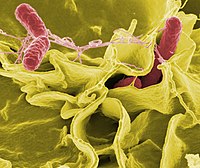
Photo from wikipedia
Few studies analyzed the association between blood culture time to positivity (TTP) and risk of complicated nontyphoidal Salmonella (NTS) bacteremia. We conducted a retrospective study of 206 patients (aged 60.4… Click to show full abstract
Few studies analyzed the association between blood culture time to positivity (TTP) and risk of complicated nontyphoidal Salmonella (NTS) bacteremia. We conducted a retrospective study of 206 patients (aged 60.4 ± 17.4 years) with NTS bacteremia during a 30-month period. Complicated NTS bacteremia was defined as the presence of 30-day mortality, complicated infection requiring surgery or abscess drainage, or requirement of intensive care unit admission. Serogroup D (75.7%) was the predominant isolates. Malignancy (44.7%) was the most prevalent comorbidity. Patients with rapid TTP (<10 h) were more likely to have thrombocytopenia, septic shock, persistent bacteremia, complicated infection, and a higher intensive care unit admission rate. In multivariate logistic regression model, a TTP <10 h was an independent predictor for complicated NTS bacteremia (adjusted odd ratio, 5.683, 95% confidence interval, 2.396-13.482). Our study showed that blood culture TTP provides important diagnostic and prognostic information in the treatment of NTS bacteremia patients.
Journal Title: Diagnostic microbiology and infectious disease
Year Published: 2018
Link to full text (if available)
Share on Social Media: Sign Up to like & get
recommendations!